 Petzlover
Petzlover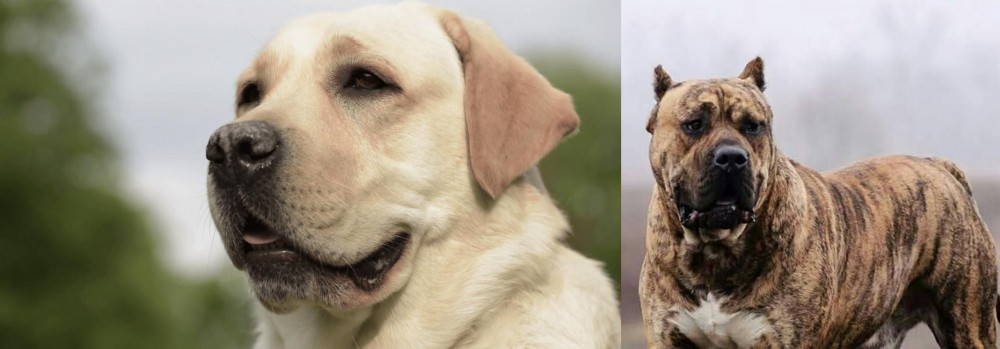 Labrador Retriever is originated from Canada but Perro de Presa Canario is originated from Spain. Both Labrador Retriever and Perro de Presa Canario are having almost same height. Labrador Retriever may weigh 34 kg / 74 pounds lesser than Perro de Presa Canario. Both Labrador Retriever and Perro de Presa Canario has almost same life span. Both Labrador Retriever and Perro de Presa Canario has same litter size. Both Labrador Retriever and Perro de Presa Canario requires Low Maintenance.
Labrador Retriever is originated from Canada but Perro de Presa Canario is originated from Spain. Both Labrador Retriever and Perro de Presa Canario are having almost same height. Labrador Retriever may weigh 34 kg / 74 pounds lesser than Perro de Presa Canario. Both Labrador Retriever and Perro de Presa Canario has almost same life span. Both Labrador Retriever and Perro de Presa Canario has same litter size. Both Labrador Retriever and Perro de Presa Canario requires Low Maintenance.
 The Labrador Retriever has its origin from Newfoundland which is an island.Dorset Eskimos are the people who settled down first in Newfoundland. Newfoundland was discovered in 1494 by the Bristol traders from England. The people in the Newfoundland used Lab to help them during fishing.They were recognized as a kennel club breed in England.
The Labrador Retriever has its origin from Newfoundland which is an island.Dorset Eskimos are the people who settled down first in Newfoundland. Newfoundland was discovered in 1494 by the Bristol traders from England. The people in the Newfoundland used Lab to help them during fishing.They were recognized as a kennel club breed in England.
The Lab has its special talents in fishing, it nicely holds the fish in its mouth and swims well to bring it to the fisherman who was its master. They are also used to hunt game birds and waterfowl.
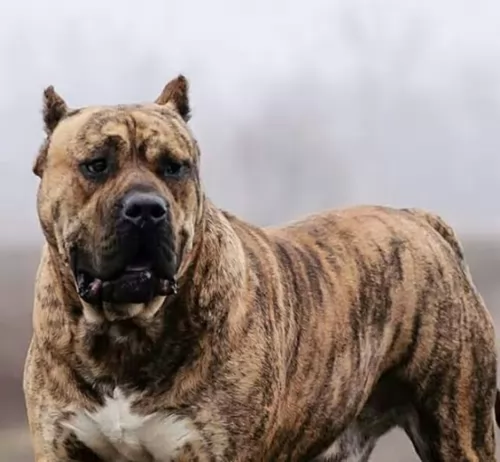 This large dog, also known as the Canary Mastiff, is a rare Molosser-type dog hailing from the Canary Islands.
This large dog, also known as the Canary Mastiff, is a rare Molosser-type dog hailing from the Canary Islands.
It does appear as if, according to records, that these dogs were also consumed at one time. The dog has also been used as a cattle dog as well as being used for dog fighting till the middle of the 1900s. Dog fighting was prohibited in the 1940s but it continued for a number of decades.
As people became interested in other dog breeds, the Presa nearly died out but some breeders revived the breed because of it having some good characteristics – territorial, brave, protective and intelligent. The FCI recognized the dog in 2011.
 Lab is a nice companion and also it helps in doing several works if it is trained. Lab is the America's most popular breed. They help the hunters, works with police and also serves physically challenged people. They are very friendly and it helps people so much by doing many works. They have very good sensitivity and are so affectionate with family members.
Lab is a nice companion and also it helps in doing several works if it is trained. Lab is the America's most popular breed. They help the hunters, works with police and also serves physically challenged people. They are very friendly and it helps people so much by doing many works. They have very good sensitivity and are so affectionate with family members.
They have very high energy level in their young stage. The Lab is a muscular and athletic dog. They are sweet natured and well deserved. Lab needs physical and mental activities regularly as they are very intelligent and energetic. The pure bred Labs have black, chocolate and yellow colours. They are very interested in hunting and roaming. The young Lab should be given training to swim as a child, as they likes it very much. They takes more time to mature hence remaining as teenager for a long time when compared with other breeds.
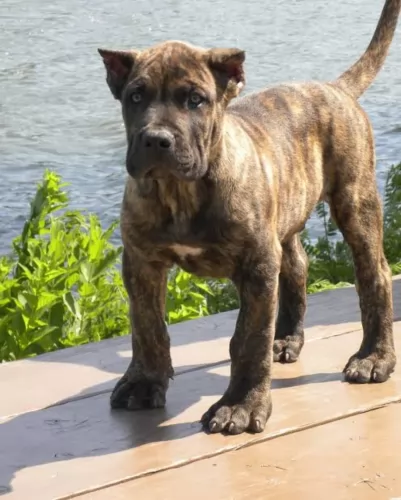 The Perro de Presa Canario or Canary Dog is large and muscular. He stands at 58 to 66cm in height and weighs anything from 40 – 70kg. He has a deep bark.
The Perro de Presa Canario or Canary Dog is large and muscular. He stands at 58 to 66cm in height and weighs anything from 40 – 70kg. He has a deep bark.
The head is broad and the ears are normally cropped to give him a more aggressive appearance. With ear cropping being banned the ears are close fitting to the head and are floppy. This is one of those dogs where the rear of the dog is slightly higher than the shoulders.
The coat is short and there is no undercoating. It is available in all different shades of fawn and brindle. The breed standard requires the dog having a black mask.
Canine experts tell us that this large working dog has got such fearless guardian characteristics that they wouldn’t recommend this dog for first time dog owners. On the other hand however, there are dog owners who claim that with good socialization, this dog becomes docile and amicable around their human family.
He is a clever dog so training and socialization will be easy and it will be worth it. This is a dog noted for its strength, it’s strong personality and potential for aggression, so training and socialization will be most important.
 The Lab has a very good adaptability, it will get adjusted with its environment.
The Lab has a very good adaptability, it will get adjusted with its environment.
Lab has a good learning ability and it can learn upto 300 human phrases. They are the 7th most intelligent dog breed.
They are very much interested in playing with kids and are a very good companion for them.
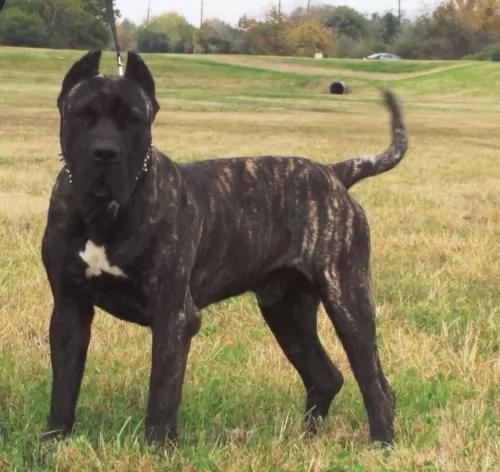 Contrary to what many people think, the Perro de Presa Canario can be a calm, gentle dog when trained and socialized properly.
Contrary to what many people think, the Perro de Presa Canario can be a calm, gentle dog when trained and socialized properly.
It is only when you bring an older, unknown dog into your midst that you would have to exercise caution with him as he can then be aggressive.
Dogs become dangerous and aggressive when they are brought up by aggressive, uncaring people. Humans are always to blame for the way a dog turns out. Provide this large dog with a loving, caring home, and he’ll show you what a remarkable pet he can be.
 The Perro de Presa Canario can live to be between 8 and 12 years of age. Being a large breed the dog can be susceptible to hip dysplasia and other problems such as cancer and heart problems. It is highly unlikely that a well cared for dog will get any of these illnesses.
The Perro de Presa Canario can live to be between 8 and 12 years of age. Being a large breed the dog can be susceptible to hip dysplasia and other problems such as cancer and heart problems. It is highly unlikely that a well cared for dog will get any of these illnesses.
It is far better to give your dog two smaller meals a day as opposed to one bigger meal as then he tends to wolf his food down. This can lead to bloat, where the stomach swells up and worse, it twists. This dangerous situation prevents fluid and air from escaping the stomach. Your dog is restless, he paces and salivates, wanting to vomit. Bloat can affect any dog at any age.
Kidney disease can develop because of some other illness or it can develop on its own. It can even be caused by bad teeth when bacteria enters the bloodstream of the dog.
 The 2 month old puppy should be given 200 to 250gms of food. 3 month old puppy should be given 250 to 300gms of food and 6 months older should be given 350 to 450gms. The varieties of food which are popular is kibbles, Barf, wet food and Home cooked puppy food.
The 2 month old puppy should be given 200 to 250gms of food. 3 month old puppy should be given 250 to 300gms of food and 6 months older should be given 350 to 450gms. The varieties of food which are popular is kibbles, Barf, wet food and Home cooked puppy food.
Lab can be fed by dry kibbles and also by raw meat or bones. Now-a-days most of the Lab are being fed with kibbles. Kibbles are the dried pellets of dog food that can be bought in pet shop or even online. Raw meat and bones are very much popular food among dog owners in UK.
For good health, Lab should be fed by a diet controlled food. Because overfeeding will lead to overweight of the dog as it causes weakness of bones.
Lab is a very energetic dog, so it should be given some time to play daily. It will be very happy if it is given a fenced ground to play and burn off his natural energy. Also it will be very good for lab if it is given chance to swim weekly once.
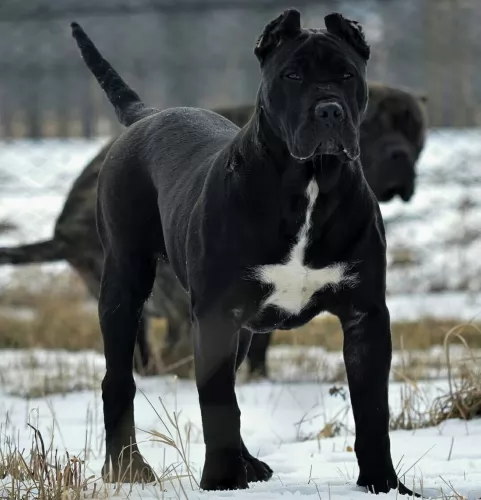 This is a short haired dog, and he isn't a heavy shedder so beyond regular twice-a-week brushing he will simply need to have his eyes and ears checked for infections.
This is a short haired dog, and he isn't a heavy shedder so beyond regular twice-a-week brushing he will simply need to have his eyes and ears checked for infections.
He will also need to have his nails clipped and to check his teeth over too. A sore, bad tooth at the back of your pet’s mouth can cause terrible pain but also play havoc with his general health.
Your Perro de Presa Canario is a high-energy dog and he will need daily exercise. He will love a good walk but he will also need something more strenuous and demanding such as ball- and rope tug-of-war games.
Try and provide your large pet with a top quality commercially manufactured food – one that is packed with vitamins and minerals instead of colorants preservatives and toxic fillers.
Break the monotony of feeding him only kibble by mixing in some cooked chicken, brown rice, sweet potato, carrots and spinach. Dogs love consistency and simplicity and simple meals like this with some raw meat thrown in occasionally will keep him healthy and happy. Never leave him without a constant supply of fresh, cool water.